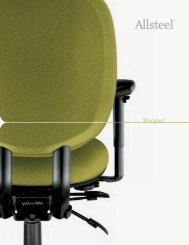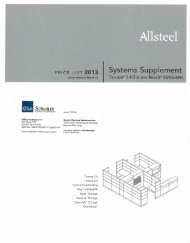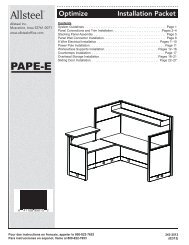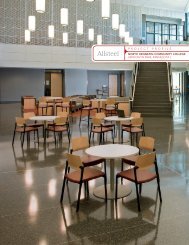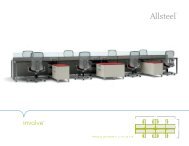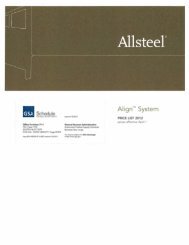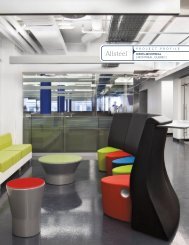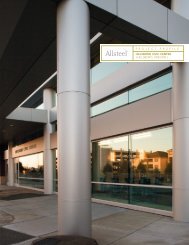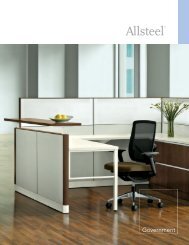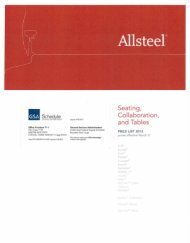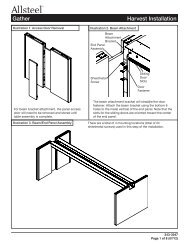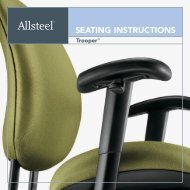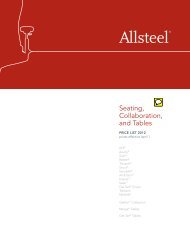The 2008 Workplace Survey - Gensler
The 2008 Workplace Survey - Gensler
The 2008 Workplace Survey - Gensler
You also want an ePaper? Increase the reach of your titles
YUMPU automatically turns print PDFs into web optimized ePapers that Google loves.
Average companies<br />
are centered on<br />
focus work<br />
21%<br />
more time<br />
100<br />
100<br />
80<br />
80<br />
Learning is far<br />
more important<br />
to top companies<br />
100<br />
80<br />
80%<br />
more critical<br />
Average companies spend half of their work week in focus<br />
mode—21% more than top companies, even though on<br />
average they rank it less critical to their job performance.<br />
Average companies may recognize the disparity between<br />
36%<br />
what they are doing and what could create value—but<br />
they are not harnessing the performance potential of the<br />
20%<br />
work modes that distinguish market leaders.<br />
41%<br />
50%<br />
60<br />
60<br />
40<br />
40<br />
20<br />
20<br />
Compared to average companies, top-performing compa-<br />
60<br />
nies consider learning 80% more critical to job success,<br />
and spend 40% more time in this work mode.<br />
40<br />
20<br />
36%<br />
20%<br />
0<br />
0<br />
Top-performing Companies<br />
Average Companies<br />
CRITICALITY<br />
LEARNING MODE<br />
TIME SPENT<br />
FOCUS MODE<br />
Top-performing Companies<br />
Average Companies<br />
CRITICALITY<br />
LEARNING MODE<br />
Top companies<br />
collaborate more<br />
Top-performing companies spend 23% more time collaborating<br />
than average companies and consider collaboration more<br />
than twice as critical to job success .<br />
20%<br />
104%<br />
more critical<br />
43%<br />
21%<br />
100<br />
100<br />
80<br />
80<br />
60<br />
60<br />
40<br />
40<br />
20<br />
20<br />
Top-performing<br />
companies value<br />
socializing<br />
100<br />
80<br />
Overturning the notion that socializing is a time-waster<br />
60<br />
rather than a business asset, top-performing companies<br />
socialize 16% more than average companies. Further, they<br />
consider it almost three times more critical than average<br />
40<br />
companies, the largest gap among all of the work<br />
mode comparisons.<br />
20<br />
185%<br />
more critical<br />
20%<br />
7%<br />
7%<br />
0<br />
0<br />
Top-performing Companies<br />
Average Companies<br />
CRITICALITY<br />
SOCIALIZING MODE<br />
CRITICALITY<br />
COLLABORATION MODE<br />
Top-performing Companies<br />
Average Companies<br />
CRITICALITY<br />
SOCIALIZING MODE<br />
C<br />
Improving work mode<br />
performance<br />
Respondents from all companies projected that better work<br />
spaces would yield significant improvement for their performance<br />
of each work mode: 28% improvement in focus, 27%<br />
in collaboration, 27% in learning, and 23% in socializing.<br />
This establishes the equal importance of improving spaces<br />
for focus, collaboration, learning and socializing to improve<br />
employee job performance.<br />
<strong>The</strong>se findings provide insight into the<br />
complex equation of what creates value<br />
in a knowledge economy: work can be<br />
improved through the right proportion of<br />
four work modes, and in top-performing<br />
companies, even greater economic value<br />
is derived from collaboration, learning,<br />
and socializing. People believe that<br />
better design of their workplace would<br />
help them be more productive, whether<br />
the work involves focus, collaboration,<br />
learning or socializing.<br />
12 <strong>Gensler</strong> <strong>2008</strong> <strong>Workplace</strong> <strong>Survey</strong> / United States / Working Differently <strong>Gensler</strong> <strong>2008</strong> <strong>Workplace</strong> <strong>Survey</strong> / United States / Working Differently 13




